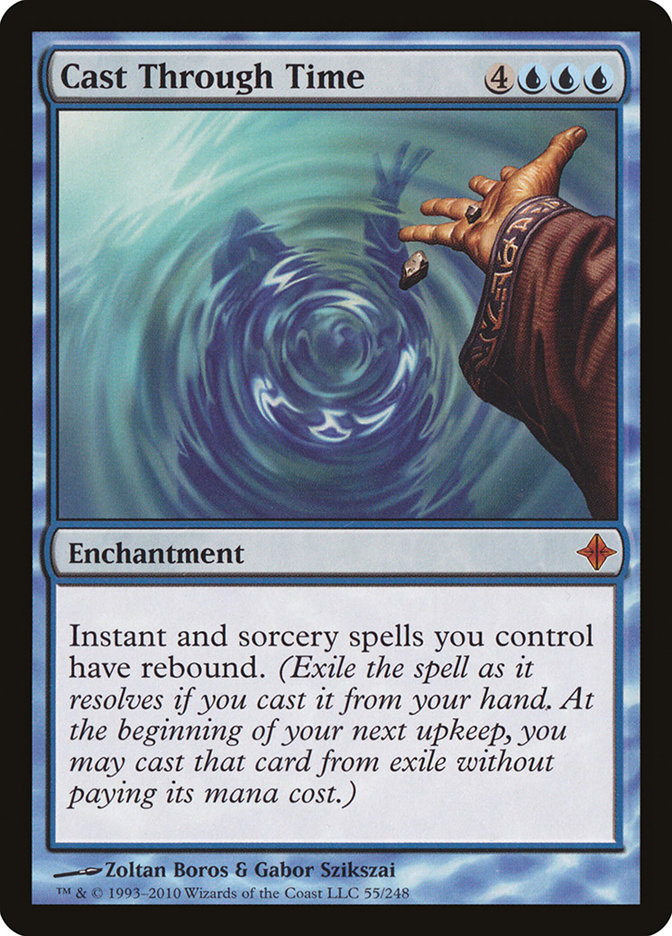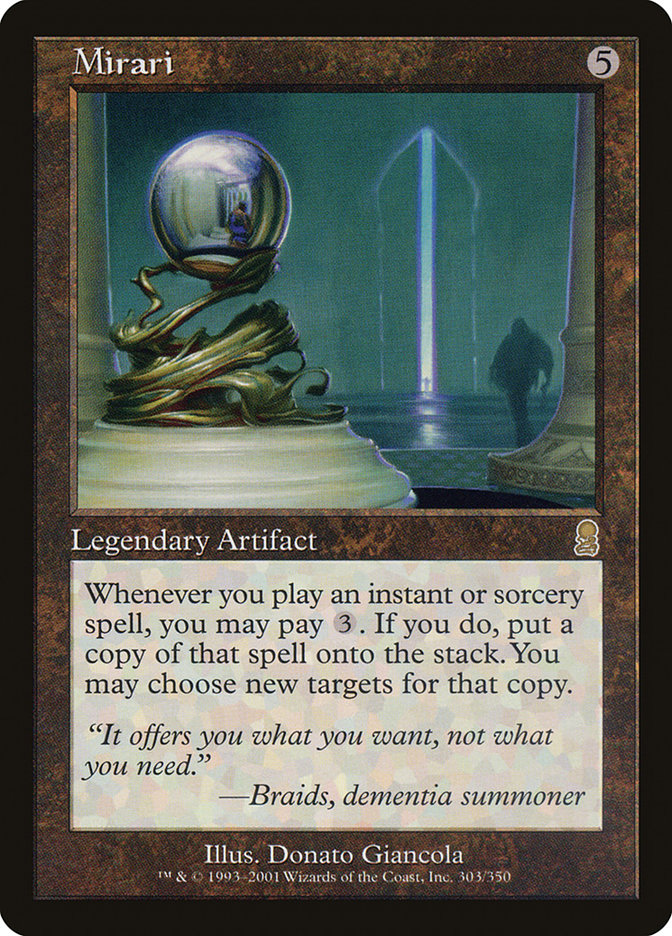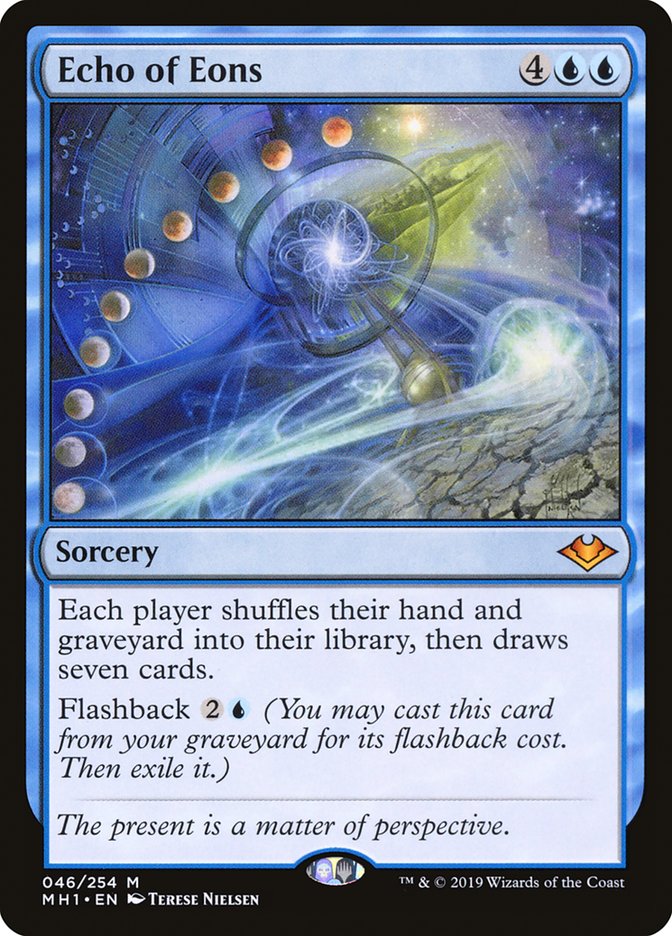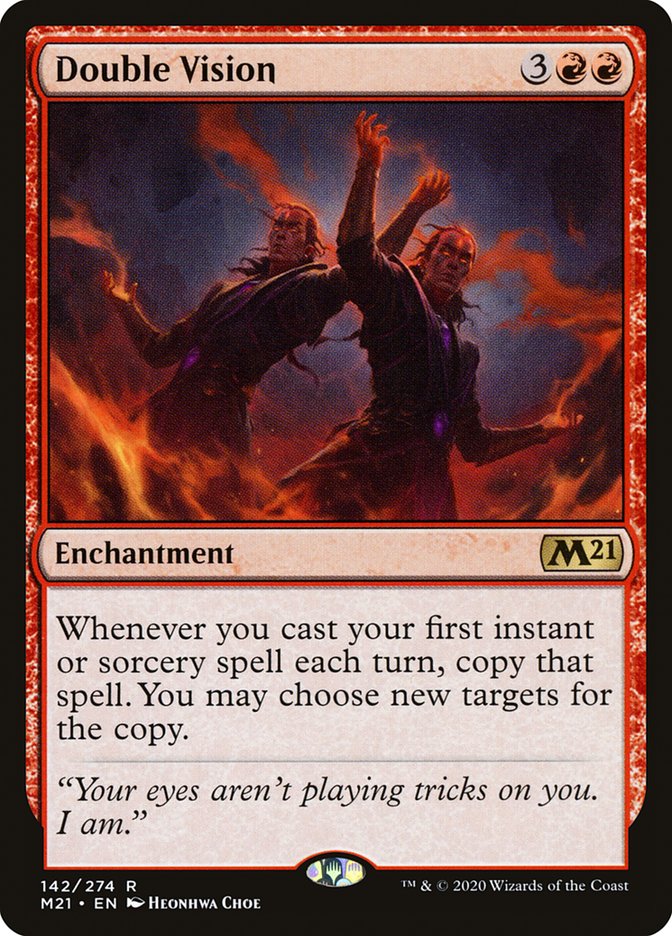Cast Through Time MTG Card
| Mana cost | |
| Converted mana cost | 7 |
| Rarity | Mythic |
| Type | Enchantment |
| Released | 2010-04-23 |
| Set symbol | |
| Set name | Rise of the Eldrazi |
| Set code | ROE |
| Number | 55 |
| Frame | 2003 |
| Layout | Normal |
| Border | Black |
| Illustred by | Zoltan Boros & Gabor Szikszai |
Text of card
Instant and sorcery spells you control have rebound. (Exile the spell as it resolves if you cast it from your hand. At the beginning of your next upkeep, you may cast that card from exile without paying its mana cost.)
Cards like Cast Through Time
Cast Through Time stands as a unique enchantment card in MTG, offering a spell-tracing capability unmatched by other cards in the game. It shares the spell-copying trait seen in cards like Mirari, which allows duplication of spells for an additional mana cost. Yet, Cast Through Time grants this ability freely without any cost, for each instant and sorcery spell with rebound, ensuring your spells not only duplicate but also bounce back for a second round.
Considering Echo of Eons, another card with a similar concept of repetition and extended effect, its primary advantage is in reshuffling the graveyard into the library, essentially refreshing potential plays. While Echo of Eons resets the game state, it doesn’t offer the consistent spell copying that Cast Through Time ensures turn after turn. Then there’s Double Vision, a card that copies the first instant or sorcery spell you cast each turn, but without the recurring structure of the rebound effect found in Cast Through Time. Double Vision creates immediate impact but lacks the long-term strategical planning bestowed by repeated casting.
Cast Through Time thus weaves its own narrative by enabling a strategic depth that encourages foresight and continued value, making it a card with a distinct and coveted place among MTG’s myriad of spells.
Card Pros
Card Advantage: Cast Through Time shines in providing players with a significant boost in card advantage. This enchantment allows you to leverage each instant spell into additional future plays by granting them rebound. When casting spells that already draw cards or disrupt an opponent’s hand, this card ensures that you get to do it all over again on the next turn, essentially doubling your value.
Resource Acceleration: By enabling rebound on instant spells, Cast Through Time can be seen as a form of resource acceleration. Although it doesn’t directly produce mana or reduce costs, giving your spells a second life allows for strategic planning and more efficient use of resources over multiple turns which can give you the upper hand in a match.
Instant Speed: While Cast Through Time itself is not an instant, it empowers your instant-speed spells, providing you with greater flexibility. You can cast an instant during an opponent’s turn, knowing it will rebound, and you can benefit from that spell once again on your next turn. This recurring benefit at instant speed can disrupt your opponent’s strategy and maintain tempo without additional card expenditure.
Card Cons
Discard Requirement: While Cast Through Time offers an intriguing benefit by granting your instant and sorcery spells rebound, it doesn’t come without its trade-offs. In the fast-paced game environment, having Cast Through Time in your hand can sometimes equate to holding onto a card that could be a more immediately impactful play, hence it can be tricky managing your hand when you’re aiming to cast this particular spell.
Specific Mana Cost: Cast Through Time is specific in its mana requirements, mandating three blue mana alongside four mana of any type. This specificity can be quite restrictive, making it a difficult card to incorporate into multicolored decks or those that don’t have a strong blue mana base, potentially leading to it sitting idle in your hand at crucial times.
Comparatively High Mana Cost: With a total mana cost of seven, Cast Through Time sits at the higher end of the spectrum. This can be quite demanding, especially when you consider that the game offers other options that could provide similar levels of utility or card advantage at a lower cost. This high mana requirement can often delay your game plan or divert resources that could be allocated to develop your board presence or disrupt your opponent’s strategy.
Reasons to Include in Your Collection
Versatility: Cast Through Time adds significant value to decks that focus on instants and sorceries. It allows for instant recreation of powerful spells during subsequent turns, elevating various strategic builds.
Combo Potential: This card opens up avenues for numerous combos, particularly in decks that leverage spellcasting to manipulate the game’s flow. The card’s ability to grant rebound to instants and sorceries means each spell gets a second chance to make an impact.
Meta-Relevance: In a meta where control decks or long-game strategies predominate, Cast Through Time can provide the consistent advantage needed to outpace opponents with a stream of repeated, impactful spells.
How to beat
Cast Through Time is a unique enchantment that elevates instant and sorcery strategies in Magic: The Gathering by granting them rebound. This means whenever you cast an instant or sorcery from your hand, it imbues the spell with a second life, allowing you to cast it once more during your next upkeep without paying its mana cost. To effectively counter this card, players need to implement disruption tactics that target enchantments.
Consider utilizing enchantment removal spells like Disenchant, Naturalize, or Mortify that can specifically deal with problematic permanents like Cast Through Time. Alternatively, cards that deny your opponent the chance to cast spells, like Damping Sphere or Rule of Law, can also curb the advantage provided by Cast Through Time. A well-timed counterspell when Cast Through Time is first cast can also prevent its activation altogether. Utilizing instant-speed interaction ensures that your opponent’s spells, whether rebounded or cast the traditional way, are met with resistance.
In essence, while Cast Through Time has the potential to dramatically shift the tide of a game, a deck equipped with the right control or disruption tools can neutralize its impact, maintaining balance and putting you in a better position to clinch victory on the battlefield.
Where to buy
If you're looking to purchase Cast Through Time MTG card by a specific set like Rise of the Eldrazi, there are several reliable options to consider. One of the primary sources is your local game store, where you can often find booster packs, individual cards, and preconstructed decks from current and some past sets. They often offer the added benefit of a community where you can trade with other players.
For a broader inventory, particularly of older sets, online marketplaces like TCGPlayer, Card Kingdom and Card Market offer extensive selections and allow you to search for cards from specific sets. Larger e-commerce platforms like eBay and Amazon also have listings from various sellers, which can be a good place to look for sealed product and rare finds.
Additionally, Magic’s official site often has a store locator and retailer lists for finding Wizards of the Coast licensed products. Remember to check for authenticity and the condition of the cards when purchasing, especially from individual sellers on larger marketplaces.
Below is a list of some store websites where you can buy the Cast Through Time and other MTG cards:
 BUY NOW
BUY NOW BurnMana is an official partner of TCGPlayer
- eBay
- Card Kingdom
- Card Market
- Star City Games
- CoolStuffInc
- MTG Mint Card
- Hareruya
- Troll and Toad
- ABU Games
- Card Hoarder Magic Online
- MTGO Traders Magic Online
See MTG Products
Legalities
Magic the Gathering formats where Cast Through Time has restrictions
| Format | Legality |
|---|---|
| Commander | Legal |
| Legacy | Legal |
| Modern | Legal |
| Oathbreaker | Legal |
| Vintage | Legal |
| Duel | Legal |
| Predh | Legal |
| Penny | Legal |
Rules and information
The reference guide for Magic: The Gathering Cast Through Time card rulings provides official rulings, any errata issued, as well as a record of all the functional modifications that have occurred.
| Date | Text |
|---|---|
| 2010-06-15 | At the beginning of your upkeep, all delayed triggered abilities created by rebound effects trigger. You may handle them in any order. If you want to cast a card this way, you do so as part of the resolution of its delayed triggered ability. Timing restrictions based on the card’s type (if it’s a sorcery) are ignored. Other restrictions are not (such as the one from Rule of Law). |
| 2010-06-15 | For the rebound effect to happen, Cast Through Time needs to be on the battlefield as the spell _finishes_ resolving. For example, if you cast Warp World from your hand, and as part of its resolution it puts Cast Through Time onto the battlefield, Warp World will rebound. Conversely, if Warp World shuffles your Cast Through Time into your library as part of its resolution, and doesn’t put another one onto the battlefield, it will not rebound. |
| 2010-06-15 | If a replacement effect would cause a spell with rebound that you cast from your hand to be put somewhere else instead of your graveyard (such as Leyline of the Void might), you choose whether to apply the rebound effect or the other effect as the spell resolves. |
| 2010-06-15 | If a spell has restrictions on when it can be cast (for example, “Cast -his spell] only during the declare blockers step”), those restrictions may prevent you from casting it from exile during your upkeep. |
| 2010-06-15 | If a spell moves itself into another zone as part of its resolution (as Arc Blade, All Suns’ Dawn, and Beacon of Unrest do), rebound won’t get a chance to apply. |
| 2010-06-15 | If a spell with rebound that you cast from your hand doesn’t resolve for any reason (due being countered by a spell like Cancel, or because all of its targets are illegal), rebound has no effect. The spell is simply put into your graveyard. You won’t get to cast it again next turn. |
| 2010-06-15 | If a spell you cast from your hand has both rebound and buyback (and the buyback cost was paid), you choose which effect to apply as it resolves. |
| 2010-06-15 | If you are unable to cast a card from exile this way, or you choose not to, nothing happens when the delayed triggered ability resolves. The card remains exiled for the rest of the game, and you won’t get another chance to cast the card. The same is true if the ability is countered (due to Stifle, perhaps). |
| 2010-06-15 | If you cast a card from exile this way, it will go to your graveyard when it resolves, fails to resolve, or is countered. It won’t go back to exile. |
| 2010-06-15 | If you cast a card from exile “without paying its mana cost,” you can’t pay any alternative costs. Any X in the mana cost will be 0. On the other hand, if the card has optional additional costs (such as kicker or multikicker), you may pay those when you cast the card. If the card has mandatory additional costs (such as Momentous Fall does), you must pay those if you choose to cast the card. |
| 2010-06-15 | If you cast a spell using the madness or suspend abilities, you’re casting it from exile, not from your hand. Although those spells will have rebound, the ability won’t have any effect. |
| 2010-06-15 | If you cast a spell with rebound from anywhere other than your hand (such as from your graveyard due to Sins of the Past, from your library due to cascade, or from your opponent’s hand due to Sen Triplets), rebound won’t have any effect. If you do cast it from your hand, rebound will work regardless of whether you paid its mana cost (for example, if you cast it from your hand due to Maelstrom Archangel). |
| 2010-06-15 | If you cast a spell with rebound from your hand and it resolves, it isn’t put into your graveyard. Rather, it’s exiled directly from the stack. Effects that care about cards being put into your graveyard won’t do anything. |
| 2010-06-15 | If you cast an instant or sorcery spell from your hand and it’s exiled due to rebound, the delayed triggered ability will allow you to cast it during your next upkeep even if Cast Through Time has left the battlefield by then. |
| 2010-06-15 | Multiple instances of rebound on the same spell are redundant. |
| 2010-06-15 | Rebound will have no effect on copies of spells because you don’t cast them from your hand. |
| 2010-06-15 | Similarly, if you gain control of an instant or sorcery spell with Commandeer, it will have rebound, but the ability won’t do anything because that spell wasn’t cast from your hand. |
| 2010-06-15 | The rebound effect is not optional. Each instant and sorcery spell you cast from your hand is exiled instead of being put into your graveyard as it resolves, whether you want it to be or not. Casting the spell during your next upkeep is optional, however. |
| 2010-06-15 | You’ll be able to cast a spell with flashback three times this way. First you can cast it from your hand. It will be exiled due to rebound as it resolves. Then you can cast it from exile due to rebound’s delayed triggered ability. It will be put into your graveyard as it resolves. Then you can cast it from your graveyard due to flashback. It will be exiled due to flashback as it resolves. |



